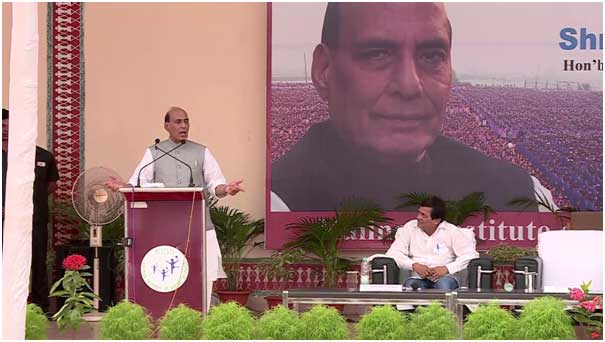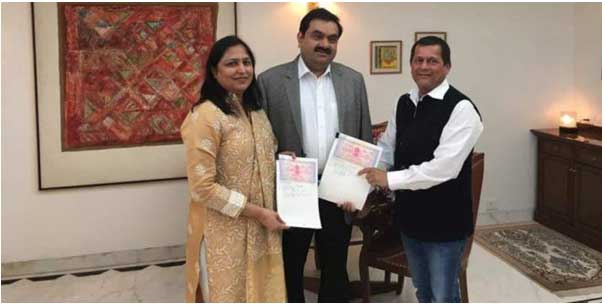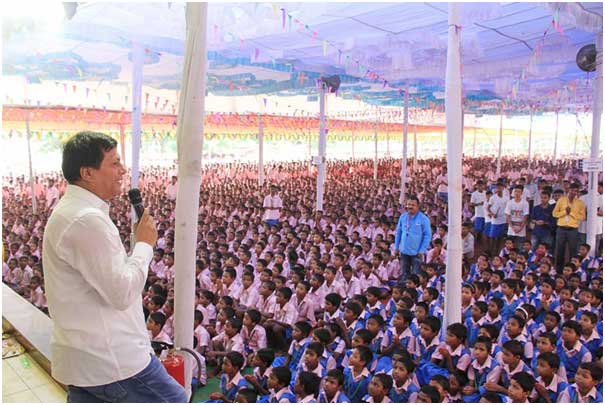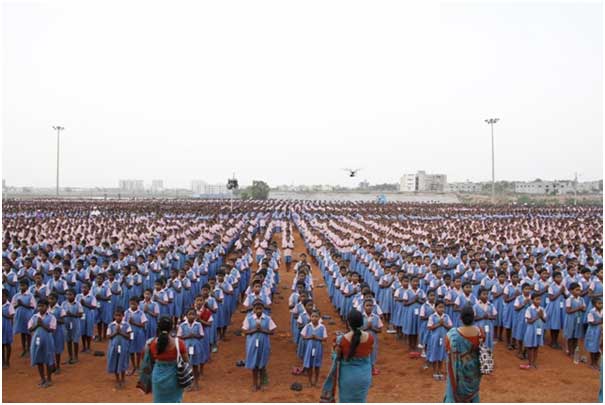Elections in India are strange occasions, where parties and their rhetoric strangle the public discourse, leaving the common people to respond and think of their problems all alone. The strangeness of a manufactured ‘democratic election’ of this kind not only leaves one with the choice of choosing between the lesser evils, but also raises questions over the hope of democratic future. The farce of Indian elections can truly be understood, when one listens to the suffering, injustices and the cry of the farmers, tribal people, minorities and dalits. Violence today has not only become a ritual part of the cyclic process in an electoral democracy but also reflects in the way policy processes are performed within the Government structures. The normalisation of violence in our everyday life haunts India’s democratic conscience and imagination, and strangely as a society and civilisation, we stand stoic not knowing the language to even comprehend the disaster we have brought upon ourselves.
The case of Kandhamal
In August of 2008, communal fires scorched Odisha’s central district of Kandhamal, which saw widespread violence against dalit Christians, allegedly instigated by Hindutva organisations. In the riots which stretched over a month several thousand Christian dalit and adivasi people were killed, raped, burnt to death, displaced and institutions ravaged down to earth by the fanatic volunteers and members of Hindu Supremacist right wing organisations. As per the various fact finding reports published, the victims of this violence have filed 3232 criminal cases against 11,000 perpetrators, whereas the police have only registered around 827 cases. Out of those cases the police have closed 315 cases citing ‘lack of evidence’. Out of the remaining 362 cases convictions were secured in only 78 cases. Out of 30 murder cases, conviction has only happened in two cases. More than 56,000 people have been displaced during the riots losing their homes and livelihood, most of whom really fear returning back to their villages.
Post the Kandhamal riots; the situation in Odisha was quite stark, making a dent in the ‘maintained’ secular image of the BJD Supremo Naveen Pattnaik. Naveen’s much touted equidistant policy came under severe questioning as allegations started mounting on Naveen Pattnaik’s silence over Kandhamal riots. In the following elections, in order to prove his secular image and maintain his equidistant policy, Naveen Pattnaik in 2009, announced that he would go to the polls on his own and broke his eleven year alliance with the BJP, confident that this move would enhance his image as a key leader in the state.
Since, then, the BJD has fought elections on its own and has been able to retain power in the state for four consecutive terms until now. But what has changed during all these years in Kandhamal? The Kandhamal Lok Sabha seat in Odisha came into existence in 2008, after the presidential notification for delimitation of constituencies. In this election and each of the last three elections, the BJD and BJP have nominated new candidates who are neither local, nor established party members. Only the Congress has bucked this trend, nominating a local candidate: the president of their Baliguda town.
Who cares?
Kandhamal, where the second phase of voting is over, largely sees a battle between two perpetual outsiders. The Congress candidate Manoj Acharya doesn’t have so much popularity and is being seen as a marginal candidate. Achyutananda Samanta, MP Rajyasabha (BJD) and Aira Kharabela Swain (BJP) are neither natives of Kandhamal nor are they adivasis. Kandhamal constituency, where more than 50 percent of the voting population are adivasis, sees this as a disrespectful gesture. Prakash, a 43 year old Kondh adivasi in G Udayagiri, said “Neither the BJP nor the ruling party of Odisha have any respect for adivasis here. They have fielded candidates whom we don’t know anything about. They don’t know what our problems are! How do we vote them to power?” This was not the concern of Prakash alone, similar questions were also raised within the BJD when the candidature list was announced by the BJD supremo. In fact, there was huge dissatisfaction amongst the local BJD unit when they got to know that Achyuta Samanta had been given a ticket from BJD as their Lok Sabha Candidate. Swain on the other hand, though an outsider, has been a long time associate of the BJP from the Balasore Constituency in Odisha where he has won three terms, before his departure out of politics for nearly ten years, post 2009 riots on the grounds of “Conflict of Opinion”.
The tragedy of communal riots in Kandhamal as it stands today is that, justice for the Christian dalit community members, who have largely been affected by the riots, which shook the nation, does not even form a part of the concern for most candidates who are contesting the elections. In fact, to a large extent, the fielding of new faces since 2008 is a crude strategy by both the BJP & BJD to divert the attention of the people, so that the burden of memories, the post trauma of the riots and the failure of the criminal justice system to punish those who planned the killings don’t haunt their self-conscience. Rohan Nayak’s family are a victim-survivors of the riots and are still awaiting justice and compensation money eleven years after the pogrom. “How can we expect justice or any compensation now? Nobody wants to talk about it. No party is different. They fear talking about this; they think it will end up splitting their votes? There are still thousands of people who haven’t got their due compensation or justice. The only option left with us is to migrate for work to nearby cities” says Rohan Nayak, who has come home after three months from Hyderabad where he works as a security guard. “The government is indifferent to the victim-survivors of the riots and also not bothered to make any attempt towards restoration or reconciliation” says a scholar at the Central University, who has been studying the post-riot situation in Kandhamal for more than three years now. In 2016, The Supreme Court had directed the government of Odisha to enhance the compensation for victims further by twenty percent, saying the earlier amount was inadequate following a petition filed by Fr Ajay Singh. “Nothing has been done until now by the Odisha Government and neither does it affect the conscience of the people who shamefully come from outside and ask for votes” says Rohan’s mother with teary eyes. Her brother was killed by the Hindu Mob during the Pogrom in 2009.
The somnolescent state of the Naveen’s Government in failing to provide justice to the Christian minorities in the state was severely criticised, in a recent gathering organised by the Delhi Minorities commission in October, 2018, by Anto Akkara, a journalist who won an award for his investigation on Kandhamal riots. Anto is quoted as saying “Because of a fraudulent verdict, seven innocents have been languishing in jail for a decade, while the perpetrators of the carnage – the Sangh Parivar is remaining unscathed, and flourishing and surging ahead, while the judiciary remains a mute spectator to this travesty of justice.”
The Myth of being a Messiah

Achyutananda Samanta, joined BJD just weeks before, he was to deliver the Welcome address of the 105th session of the Indian Science Congress, 2018. In his speech, Samanta, patronised Modi as a true visionary for India, using his name more than seven times in his eight minute long speech. Samanta, is the founder of two private institutes in Bhubaneswar, KIIT & KISS Universities. Kalinga Institute of Social Sciences, the much touted World’s largest fully free residential school & university exclusively for tribal children educates more than 20,000 tribal children from various districts of Odisha. Samanta has been in the heart of controversies, largely, since 2013 about the encroachment of forest land and Child welfare committee report on the social conditions under which the children are forced to stay at KISS. In March 2017, the Eastern Bench of the National Green Tribunal had directed the Odisha government to fence the forest area that the institute has encroached upon. Not paying heed to the direction of NGT order, Five Union ministers of the BJP shamefully visited the KISS institute, when the BJP’s National Executive meeting was convened in Bhubaneswar from 15th to 17th March, 2017. Samanta, who is known to have a powerful PR team, Media house and corporate lobbying for investment into KISS, today is being showcased as the messiah of tribal people.

Samanta’s close proximity with the top level BJP leaders so near to the general elections must have worried Naveen, because of the large number of tribal votes that Samanta can garner by appealing to the parents of more than twenty thousand tribal children studying at his institute. Cashing onto the situation, Naveen, being shrewd and clever, nominated him as BJD’s candidate in Rajya Sabha in February 2018. And a year later fielded him as the BJD’s face in Kandhamal. On the other hand, Samanta, who had been denying any involvement into politics as late as 2013, now is keen to take the opportunity up because of the allegations and charges mounting up on the institute since late 2014. Samanta’s KISS although is said to have international recognitions with bodies like United Nation is facing severe criticisms and questions from national and international tribal rights organisations and scholars regarding the MOUs the institute has signed with mining giants like Vedanta, NALCO and Adani, the very corporations which are displacing tribal people out of their forest lands. Jo Woodman, Survival International’s campaigner on indigenous education says “We are deeply concerned about Factory Schools like KISS which take children away from their homes, families, languages and cultures and teach them to aspire to a future that is divorced from their indigenous ways of life. Globally we are seeing a resurgence in indigenous-controlled education which gives children profound pride in their language and identity, but in India we are seeing the opposite: the proliferation of schools which teach Adivasi children that they must ‘join the mainstream’ by being – in effect – reprogrammed to see their deep connection to their lands and culture as ‘primitive’ and wrong. This is one of the greatest threats to tribal peoples in India – and beyond – today.”
The Factory schooling model of KISS

Ziauddin Sardar, the Pakistani scholar in the year 2013, wrote an article in Times London, after the visiting KISS school in Bhubaneswar. His piece, Help tribal people, but don’t proselytize was more of a warning than that of an appreciation for KISS. In fact, Zia begins by saying “Monotheistic religions do not have a good record of interacting with tribal cultures. It is hardly surprising. If you regard tribal people and their religion as primitive and your eventual goal is to save them through conversion, then you are not going to pay much attention to their own hopes and desires.” True to his observation, the KISS school is rooted in its monotheistic and colonial way of seeing the tribal people and their culture. It aims to ‘convert tax consumers into tax payers and social liabilities into assets’ as the per the institutes mission statement. . It is said that tribal children from 62 tribes, including 13 particularly vulnerable tribes (PVT), study at the KISS school. Children as young as six years of age are admitted into KISS. The institute recently bagged the offer to host the World congress of Anthropology (IUAES) in 2023 based on the premise that it is ‘the world’s largest anthropological laboratory’ as described by its mentor and BJD’s Lok Sabha Candidate from Kandhamal Achyuta Samanta. Describing twenty thousand tribal children as a specimen of a laboratory is not only a disgusting and racist act, it completely undermines the very human value that these children carry.
Most of the Hindu festivals like Saraswati Puja, Holi, Ganesh Puja and Durga Puja are celebrated with much glory at the KISS school, where children are cultured into volunteering for these festivals from a very young age, as is also seen in the Sishu Mandir or Vanvasi Kalyan Ashram schools run by the Rashtriya Swayamsevak Sangh. Mainstream Odiya festivals like Rath Yatra and Nuakhai find a place in the KISS calendar; none of the tribal festivals are celebrated in the school. The students are in a way kept away from their community rituals, practices and worships. Lado Sikoka, the Dongria Kondh leader whose community has been opposing the mining of their sacred site at the Niyamgiri hills said that “Schools like KISS are entirely a conspiracy by the government and private companies, to take away our children and to de-link them from our forest, culture and language.”

Tribal residential schools of such kind have always been in question and have had severe traumatic effects on tribal children, if we look at the history of residential schools across the World. A residential school not only alienates tribal children from their community’s ethos and values, but also disengages them from their tribal identities and causes an inter-generational gap in their ways of learning. Many children, who do not have enough scope to speak or think in their mother tongue, tend to forget their language. In Kandhamal, the number of children speaking Kui language is drastically deteriorating. Many adivasi families who have been proselytised under Hindu and Christian folds do not see it necessary to teach their children Kui language, particularly because most tribal residential schools and Govt. schools, do not encourage the parents nor do they have enough Kui teachers in schools to teach children. Kailash Dandapat, a social worker in Daringbadi, Kandhamal, says “I really am worried, because I fear that in the next ten to fifteen years, there would be no speakers of Kui in this region.” He further adds “that the very idea of boarding schools for smaller tribal children is very disastrous, as it is not the child who only suffers alienation but also the parents, who are slowly losing their parenting skills”. Residential schools in India for tribal children perhaps symbolise this gruesome colonial legacy and are an important marker of how tribal communities are being systematically consumed under the globalised project of ‘mainstreaming tribal children’. The setting up and expansion of KISS model residential schools, which Samanta aims to do in twenty tribal districts of Odisha is going to further affect tribal communities, promoting an unacknowledged policy of assimilation into the mainstream, that follows very closely the pattern of ‘stolen generation’ boarding schools into which indigenous children were forced throughout North America and Australia: a deeply harmful policy for which the Prime Ministers of Canada and Australia have apologized to their indigenous citizens.
KISS of death
Samanta, in February, during one of his recent visits for election campaigning to Kandhamal, laid the foundation stone for KISS school’s branch in Simanbadi. The ceremony was held at Dakarbadi Mouja, Simabadi Panchayat where the site for the school has been finalised. The function was attended by many villagers nearby. He announced at the event that the residential school will function exclusively for the Christian boys and girls in the region. Samanta in one of his recent social media posts claimed that the Pastor Association of Daringbadi had requested him to setup a satellite centre of KISS at Daringbadi on Jan, 10, 2018. Many people, on the contrary, had raised questions particularly considering the timing of its announcement just weeks before elections. The land for the site was purchased within a quick span of ten days as per the social media update from Samanta’s profile. As per the local people of Sulikoti village (just a couple of kilometres from the proposed site) and wife of Mr. Kedarnath Sahoo (the land owner), the land has not been purchased yet. Pratima Sahoo clearly said “There has not been any exchange of papers or money, but we have agreed to sell our land, because we want to see development in Kandhamal”. When asked about the new KISS School in Simanbadi for Christian children, Rev. Madan a resident of Baliguda said “Although it is a welcoming gesture as there weren’t many hostels or policy provision exclusively for Christian minority children in Kandhamal, but we are equally concerned and deeply apprehensive with respect to the modalities and functioning of the school.” The already polarised situation in Kandhamal particularly with failure in justice systems over the years for the victim-survivors is again seeing the slow growth of heat over this KISS school exclusively meant for Christian children. Lingaraj Dala Behera, the BJP Zilla Parishad leader who seems to have sparked up this debate by asking why it will only serve Christian children, has worried many of the BJPs potential Adivasi voters in the area. The Assistant Sarpanch, Mr. Mohan Pradhan of Simanbadi, who proudly calls himself a Hindu Adivasi feels let down. He said “Earlier, when we heard about the KISS school, we thought, it will be a school for all. But, on the day of foundation, they said “it’s exclusively for Christians children. How can this be? We shall protest against this and file complaints wherever necessary. We won’t let this happen.
The election manifesto of BJD, 2019 this time, finds a new mention about establishment of tribal educational complexes in urban centres for tribal children. What are these educational complexes? How are they going to be financed? Why are they going to be established in urban centres for tribal children? Won’t establishing educational complexes in urban Centres undermine and sideline the Gram Sabhas? These questions have no clear answers in the BJD election manifesto, and the local media houses which belong to various political parties are maintaining a tight lipped silence over this issue. Is this the reason why Government-run day schools are slowly being dismantled across various tribal districts of Odisha? The process of closure is currently plaguing the government school systems in Odisha’s tribal districts when the Odisha government put up a notice announcing closure of all state primary schools with less than five students in 2014 and two years later served notice to schools with less than 15 students. The year 2016-17 alone saw the closure of 828 government primary and upper primary schools in Odisha, with Raygada and Kandhamal topping the list with largest number of school closures with 124 and 101 respectively. Further in 2018, the district administration of Kandhamal has identified 142 schools for closure in Kandhamal district alone. Why are these schools being closed down? Is it really due to the lack of facilities or the inability and inefficiency to monitor Govt schools or is to due to the Central Govt’s directive to setup more residential schools in tribal blocks of the country with more than 20,000 people? Or is there a plan to initiate PPP model of residential tribal schools underway which the government is trying to adopt from KISS? The KISS school has done several MoU’s with private mining and corporate giants; KISS-Adani & KISS-Emami . In the light of this, one can see a larger politics and thinking at play behind the closure of Govt schools in tribal areas in Odisha.
The grave neglect of central government by not taking seriously, the CWC report and land encroachment charges on KISS, and conferring them with the leadership award from the National Commission for Schedule Caste and Schedule Tribes in Feb, 2019 which was received by the founder of KISS and sitting MP of Rajya Sabha Achyutananda Samanta, sets a wrong precedent and raises questions over the integrity of the National Commission for SC&ST.
The Politics of Samanta
Samanta’s Lok Sabha candidature in Kandhamal or his entry into politics needs to be seen keeping this in view. Naveen Pattnaik, might have used Samanta to play his tribal card, but there is a larger politics that Samanta represents which is to privatise tribal education through residential schools which is becoming a slow reality in other tribal dominated states like Chhattisgarh and Jharkhand where mining companies have themselves opened schools for tribal children. Perhaps, it is through the replication of the idea of KISS tribal schools, across many tribal districts in partnership with the mining companies and corporations that a final attempt is being made to weaken forest democracy and Govt schools so that global capitalism can make inroads into the interiors of Odisha.
The Kandhamal question is not really about which party wins the election: there are bigger politics at play and the fundamental questions still hang unsettled whether it is about justice, communalism or slow dilution of Govt schools in the tribal areas. The experience of victims and the charged climate of Kadhamal make it clear that we as a nation and society have failed on many levels. Kandhamal today, represents the larger reflection of India’s situation in terms of the crisis that the Dalit minorities and Adivasis are facing. Whether India’s democracy will survive is a question that we need to reflect upon deeply and critically.
Rajaraman Sundaresan is a special correspondent for Samdhrusti Media group, Odisha. The author would like to extend his sincere thanks to Sudhir and others who made this elaborative writing on the Kandhamal possible.










































